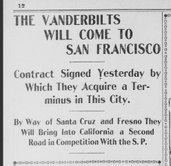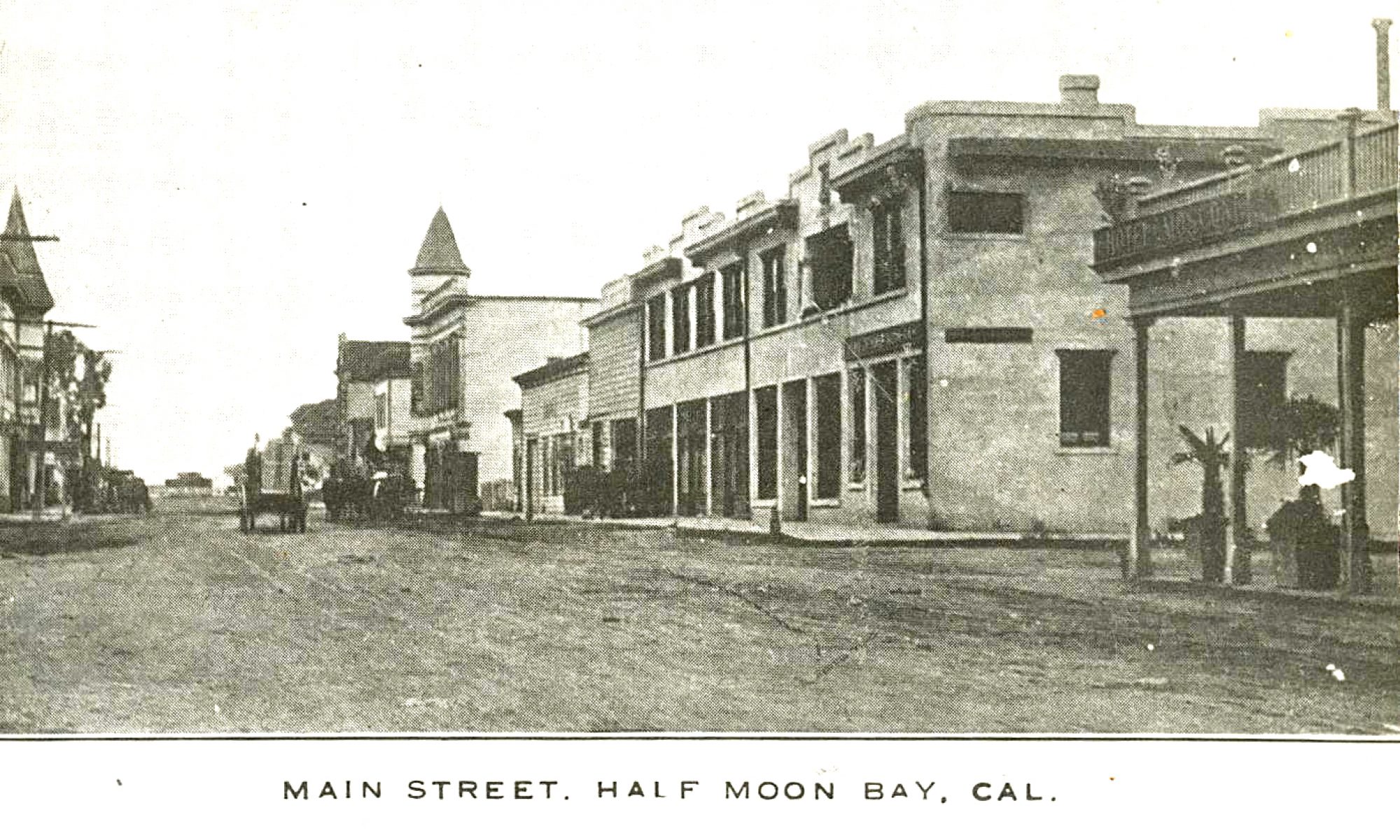Story from John Vonderlin
Email John ([email protected])

Why did the Wealthy East Coast Vanderbilt Family Want to Finance a Coastside Railroad to Compete with the Peninsula’s Southern Pacific?
Hi June,
This article, from the April 11th, 1899 issue of the “Call,” explains somewhat why the West Shore Railroad Company hadn’t yet built a track down the coast from San Francisco to Santa Cruz, despite their assertions of it being a “sure thing” in the earlier articles from 1894 and 1895 that I sent in earlier posts.
This day’s dream is that the Vanderbilts, those alleged paragons of fair play and fair prices, those East Coast “compassionate capitalists,” will be veritable “White Knights,” riding to the rescue. Success can’t be far off.
Enjoy. John
THE VANDERBILTS WILL COME TO SAN FRANCISCO
Contract Signed Yesterday by Which They Acquire a
Terminus in This City.
By Way of Santa Cruz and Fresno They Will Bring Into
California a Second Road in Competition With the S. P.
With a contract signed by their agents in New York City on the M D sth inst. the Vanderbilts have become the owners of the West Shore road to Santa Cruz. They already had control of the proposed Fresno-Monterey line, and these two systems they propose to connect with their Salt Lake-Los Angeles road, now built to Pioche, Nevada. By this combination of routes they will bring into San Francisco their transcontinental system, to work with the Santa Fe the salvation of California in bringing against the monopoly of C. P. Huntington the destructive force of pure competition and honorable business policy.
The Vanderbilts have secured ln this city a western terminal to their lately bought transcontinental railway system. By a deal consummated in New York City on the 5th of the present month they secured of Behrend Joost and his associates the rights of way and the franchises of the West Shore Railway from San Francisco to Santa Cruz via Colma and Pescadero, and for some weeks past they have had practical control of the Monterey-Fresno line from Monterey to Fresno throughthe Coast Range via Walker Pass. From Fresno a connection with the road they are now building from Salt Lake City to Los Angeles is simply a matter of laying ties and tracks.
Not alone is the Santa Fe to stand in competition with the Southern Pacificof Kentucky, and nearly every other State of the Union. Not alone is the Santa Fe to take up for the man of the hoe and the man of the mills of California the competitive fight for rates and profits and the fair living that the soil of this State should render its every tiller. Against the capital and brains of C. P. Huntington, the monopolist, are set the brains and capital of the Vanderbilts, those multi-millionaires of the East who have builded world-famous fortunes by open fighting and fair competition, and it is now no more than the time required to fill with track and prosperous stations the two gaps that exist before San Francisco will be sending its drays and its clerks to receive the cargoes hauled in under the steam of the second competing road.
The negotiations that resulted in the deal of the 5th inst. were opened some six weeks previous to the late visit of the numerous Vanderbilt parties to this coast. Simultaneous with their arrival here came a representative of the Vanderbilts’ New York agents, Freeman & Jones, of 51 Broad street, New York. Laden with the field notes of the numerous surveys that have been made, provided him by Behrend Joost, he traveled and inspected the route of the proposed road from this city to Santa Cruz. Not only did he look into the feasibility of the road itself, but he investigated thoroughly the income-producing capacity of the country which it taps.
The redwood forests that surround Pescadero and the dairies and farms, the most extensive outside the San Joaquin Valley and more fertile than they, impressed him at sight, and his favorable observations he communicated directly to the Vanderbilts during their much-written-of stay at Del Monte. Communication between them and their New York agents at once ensued. Through General W. H. H. Hart, who has long been their advising atttorney on this coast, Behrend Joost was approached and through him the rest of the West Shore Company. Joost and his confreres were in a proper state of mind to talk business on business principles. For more years than history cares to tell of it the completion of the coast road to Santa Cruz has been Joost’s annual dream. Late in ’97 he had got all of his rights of way. There were some stickers alone the route and they held out for stiff prices, but popular pressure finally had Its effect and the May was clear for a seventy-minute competing track to the seaside city. Then Joost and the company discovered either that they did not have or did not care to risk the money the road and its rolling stock would cost Quietly the deal was called off and Joost came on the market to sell his franchise. It was valuable and worth the price he asked and more. Besides the clear Tights of way about $65,000 had been expended In grading a roadbed over the most difficult portion of the proposed route, a strip of beach at Waddell Creek, twenty-two miles from Santa Cruz. Add to this the fact that the line extended from San Francisco’s waterfront at a point south of Islais Creek and out of the county by way of Colma, and ran thence to San Pedro Point and along the coast through seventy miles of the grandest marine scenery that California boasts, and Mr. Joost had probably as marketable a piece of property as could be found waiting a purchaser. But the market was timid of Mr. Joost. At the mention of his name on the street it held up its financial skirts like an old dame at a mouse. In Its prejudice it was blinded to one of its best opportunities and finally the west shore line was hawked over the streetsand offered for anything to anybody. Then the Vanderbilts got their Salt Lake line on the way to Los Angeles builded as far along as the little mining town of Pioche, over In Nevada.
Three months ago the papers told of a mysterious surveying party that had been laying out its line and driving its significant little red-topped pegs into the shifting sands of the deserts between the thirst-stricken Nevada line and the orange groves of tho southern city; and they told further of an agent, of whom no one knew or would tell, who went along ahead of them and bought up or secured rights-of-way over the country to be surveyed. All was done quietly and without ostentation. Not the cleverest correspondent could get a line on the story and it remained as much a mystery until today when back from New York came the contract that made it all as plain as day.
By its terms the Vanderbilts assume of Behrend Joost and his fellow-stockholders the entire right of way of the West Shore Railroad Company from San Franicsco’s water front via Islais Creek, Colma, Halfmoon Bay and Pescadero to Santa Cruz. In return they guarantee to grade and build the road, establish stations and equip with such rolling stock as the traffic may demand this for the present and for this end of the line.
The visit of the Vanderbilts to Del Monte, however, developed the fact that the West Shore transaction was to be merely incidental to the main proposition. They were not looking for a mere source of pastime in Pacific Coast finance, but under the guise of a rollicking pleasure trip were seeking out a western end, and a means of getting to it, to that petty hobby, recently realized, of Mr. Vanderbilt’s, his transcontinental road.
Their trip to Monterey was not so much to gather sea mosses and catch perch from the end of the one lone wharf as to inspect the dock and terminal facilities of the proposed Monterey and Fresno Railroad. Over that line the rights-of-way and franchises have also been clear and the road bandied back and forth across the market since ’96. It leads from Monterey to the heart of the San Joaquin by the most direct route, Walker Pass,and from there a connection with the Salt Lake-Los Angeles road is an easy possibility at almost any point on the desert, and, for the most part, over Government land.
Upon equally good authority it is said that the Vanderbilts have secured, on practically the same agreement, the entire line of the last named road. Between the terminal of the West Shore line at Santa Cruz and the Monterey-Fresno line, there is a gap of forty-four miles extending round Monterey Bay, which is covered by neither franchise nor rights-of-way. but the people of that section have been for so long going into debt to C. P. Huntington for their tree slips and seeds, that an easy road is open to the agent of the Vanderbilts now working in that section.
It was rumored that they were negotiating with the Spreckels people for the narrow-gauge road now owned by them from the prosperous city of Watsonville to that equally thriving burg, Salinas, but this John D. Spreckels denies, and states that he will maintain that road solely as an adjunct to the Spreckels beet-sugar interests in that locality and as an agent for the further building up of the two counties. There are two or three routes, however, other than that occupied by the Spreckels line by which Monterey or Salinas may be reached, and the agent for the Vanderbilts In this city. General Hart, anticipates no trouble in acquiring one of them.
The acquisition of Santa Cruz and Monterey as stations on their line will give the Vanderbilts an equal shipping advantage with the Southern Pacific. The two cities command the opposite boundary points of Monterey Bay, which is, even in heaviest weather, an Ideal anchorage and only a short haul from this city. The advantage will be with the Vanderbilts for the reason that their route along the coast is over an hour shorter than either of the Southern’s Pacific’s present lines and will cost, comparatively, nothing in maintenance. The contract which binds all this and makes of an airy possibility a cast iron assurance that the Santa Fe and Valley roads in their combination are to have the weight of independent millions and fair, open principle with them in their fight against the relentless and dollar-marked tyranny of the Southern Pacific. With California’s new and splendid opportunities in the Orient is to work jointly the facility of competitive transportation from the markets of the whole country and the document received yesterday puts these possibilities beyond the grasp and greed of C P. Huntington.
It was signed in this city for the West Shore Railway Company on March 25 by R. S. Thornton, the president, and by R. J. Willats, the secretary. Then it was forwarded to New York and signed by Freeman & James agents for the Vanderbilts, on the 5th inst, It guarantees to the stockholders that the New York people shall fully equip the road with modern steel bridges, track and rolling stock, and that they, the shareholders, shall participate proportionately to the amount of their stock in the only company in the new concern. General Hart, who holds the contract cannot speak to a certainty but says he is authoritatively informed that active work will be begun within the next sixty days.
